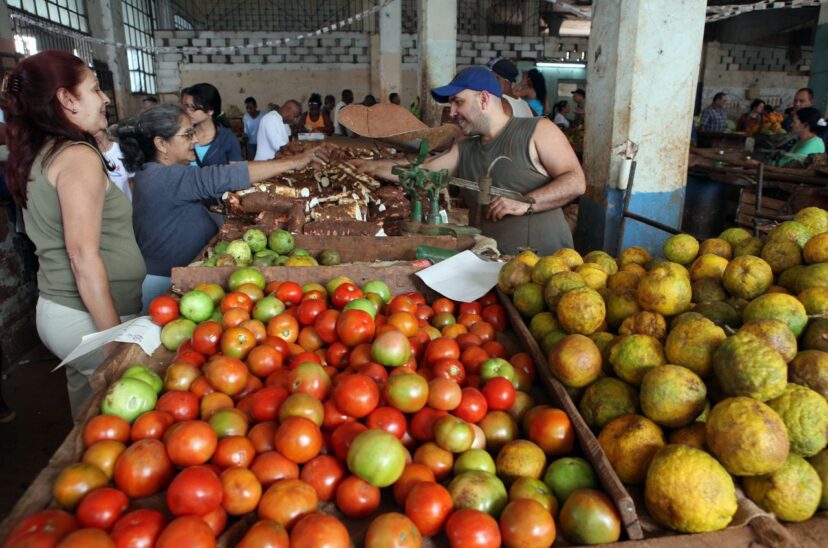26th June 2023
Official figures confirm that inflation in Cuba continues to surge. Their publication comes as many educated young Cubans and their families are choosing to either migrate or leave the state sector, causing official concern that consequent labour shortages may result in a decline in productivity.
Recently published figures produced by the National Office of Statistics and Information (ONEI) indicate that year-on-year inflation in Cuba’s formal regulated market stood at 45.48% in May, compared to 26.16% for the same month’s inter-annual figure in 2022. The May figure showed little variance from the annualised figure in April this year which stood at 45.36%.
ONEI reported that the year on year rise was highest in relation to food and non-alcoholic beverages (66.48%), restaurants and hotels (65.02%), transportation (29.45%), goods and miscellaneous services (22.78%) , furniture and articles for the home (20.67%) and education related expenses (20.89%). It also noted that in May the monthly price of staples for pork and rice surged by 30%, and the Consumer Price Index increased by 3.64% compared to April.
The figures do not take into account the prices in Cuba’s unregulated informal market where inflation is being driven higher by demand because of the continuing shortages in the formal market, and where prices are linked to the receipt of convertible currency by Cubans with friends and family overseas. Although no accurate figure exists, analysts place annual price inflation in the informal market at somewhere between 350% and 450%, creating significant inequalities and hardship for those Cuban who do not have access to convertible currency.
In a further indication of the serious economic challenge Government faces, the closely monitored unofficial US Dollar rate to the Cuban Peso has reached an all-time high, with parts of the economy effectively dollarising as Cuba imports, according to UN statistics, almost 80% of what it consumes. In an indication of the inflationary effect, in recent weeks the CUP has continued it decline against the US Dollar and was at press time US$202 to CUP1 according to the usually reliable and widely consulted daily listing on the website of the independent publication El Tocque. Cuba’s official exchange rate remains at CUP24 to US$1, while the official Cadeca rate available to individuals and small businesses on a limited basis presently stands at CUP125 to US$1.
Government formally attributes price inflation to foreign exchange shortages and the widespread scarcity of food, medicine, fuel, spare parts, and pressure on prices, to the tightening of the US embargo, the cost of having addressed COVID, the loss of tourism at that time, and more recent global developments.
However, speaking recently, Deputy Prime Minister, Alejandro Gil, the Minister of the Economy and Planning, added the slow recovery of tourism, the poor sugar harvest, higher international prices and severe fuel shortages as factors contributing to the scarcity of foreign exchange; resulting in government, he said, having to import less, including essential inputs required to maintain production levels.
Gil also appeared to recognise that the tarea ordenamiento (reordering task), which in January 2021 in part involved the cautious unification of Cuba’s then dual currency system based on concerns about the social impact, was flawed, and is now making it harder to manage macroeconomic policy.
Inflation said to be driving labour shortages in state sector
There are signs that the bleak short to medium term economic outlook is now causing labour shortages in the state sector as skilled workers and the country’s highly educated young either leave the country or migrate to Cuba’s fast growing private sector, often utilising finance provided by friends and family overseas to establish new businesses.
Granma recently noted that the increase in vacant positions has become a headache for many managers, creating “tensions, delays and other setbacks that have an impact on the internal dynamics of entities, and also on the population.”
It quoted Merlys Gort, the Deputy Director of Labour and Social Security in the municipality of Pinar del Río as saying that there were vacant positions in areas ranging from information technology and investment to light industry, and from the economy, territorial planning and passenger transportation to the post office.
Observing that although the view expressed in January 2021 when the tarea ordenamiento came into force that it would create new employment, the official publication noted that while initially more than 101,340 Cubans had accepted a job offers, this development “did not last long.”
The article went on to suggest that finding labour for Cuba’s state sector has become increasingly difficult. Quoting Gort Granma noted this was because “salaries were too low … and because very unattractive offers predominated.” Granma also cited her as saying that behind the increase in vacant positions were “other factors such as emigration,” the difficult economic situation “marked by very high inflation,” and salaries in much of the state sector, especially budgeted entities, ceasing to be attractive.
She also noted that her own organisation had suffered “a considerable exodus of people who have migrated towards self-employment and MSMEs, in search of better remuneration.” They included, she said, highly qualified staff in charge of delivering state policy including planners, computer scientists, architects, civil engineers, and hydraulic engineers.
The article went on to quote others who made clear that unless the problem is addressed, state entities will not be able to fulfil compliance with their responsibilities or their corporate purpose.
Granma concluded ominously that “the lists of vacant positions that are causing concern today are just a symptom of a much more serious problem, which demands comprehensive action, from the training of the labour force necessary for development, to the incentives to retain it in a country that has always considered human capital as its most important resource.”
The Caribbean Council is able to provide further detail about all of the stories in Cuba Briefing. If you would like a more detailed insight into any of the content of today’s issue, please get in touch.
Foto: EFE/Alejandro Ernesto





